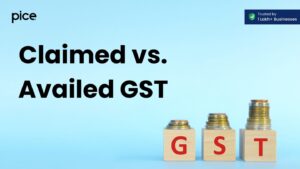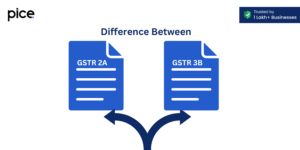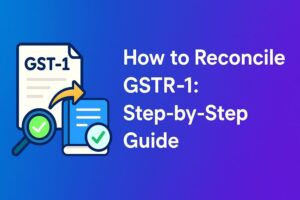GST on Immovable Property
- 19 Dec 24
- 15 mins
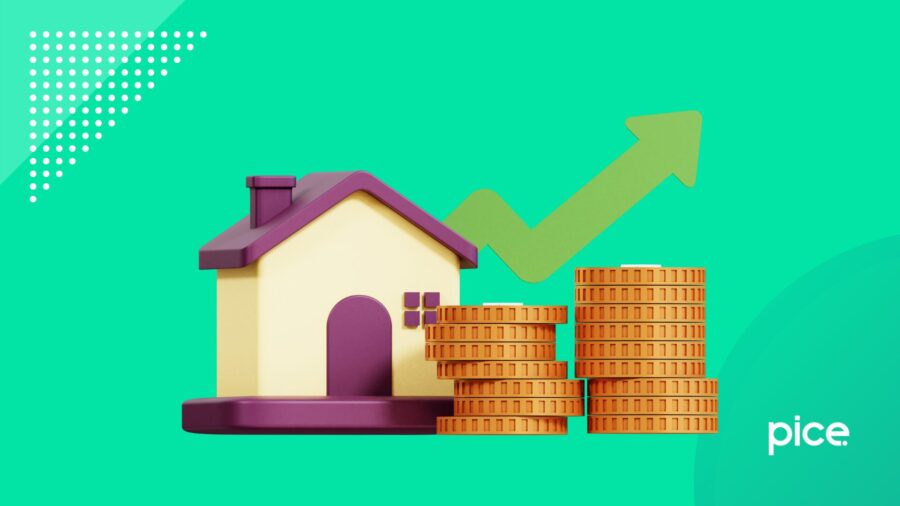
GST on Immovable Property
- Levy of GST on Immovable Property or Real Estate
- Types of Services Related to Immovable Property Exigible Under GST
- What is Working Contracts?
- Transfer of Development Rights
- What Is the Immovable Property?
- Taxability of Sale of Land Under Pre-GST Laws
- Implications of GST on Immovable Property and Exemptions
- Value, Time and Place of Supply of Land According to GST Provisions
- Input Tax Credit Rules for Supply of Immovable Property
- GST Provisions on Sale of Developed Plots or Land
- GST Implications on Renting and Leasing of Land
- Conclusion
Key Takeaways
- GST applies to renting, leasing, and construction services but exempts land sales and ready-to-move properties.
- Composite supplies like developed plots with basic amenities attract GST.
- Under-construction properties incur GST, while completed properties with occupancy certificates do not.
- Builders can claim ITC only for plant and machinery-related contracts, not for general construction.
- Long-term and short-term leases attract 18% GST, with specific exemptions for agricultural and government-approved leases.
While examining Article 366 of the Indian Constitution, you can figure out the official definition of ‘Goods’ and ‘Services’. As per the legal provisions, ‘Goods’ comprise all the commodities and articles. On the other hand, ‘Services’ signifies offerings other than goods. Based on this principle, GST (Goods and Services Tax) is levied on the consumption of both goods and services.
Similarly, GST also applies to the supply of goods and services that are either identified as ‘movable’ or ‘immovable’ property. Therefore, one can safely conclude that as long as a ‘supply’ is involved, GST will be valid. However, it is relatively broader to be considered as a proper definition. Thus, the community of GST practitioners debate often on the extent of the scope of GST.
In this guide, we will specifically highlight the effects of GST on immovable property. Additionally, we will try to cover the various types of services extended within the real estate market and provide a glimpse of project development rights. So, let us begin without any further delay.
Levy of GST on Immovable Property or Real Estate
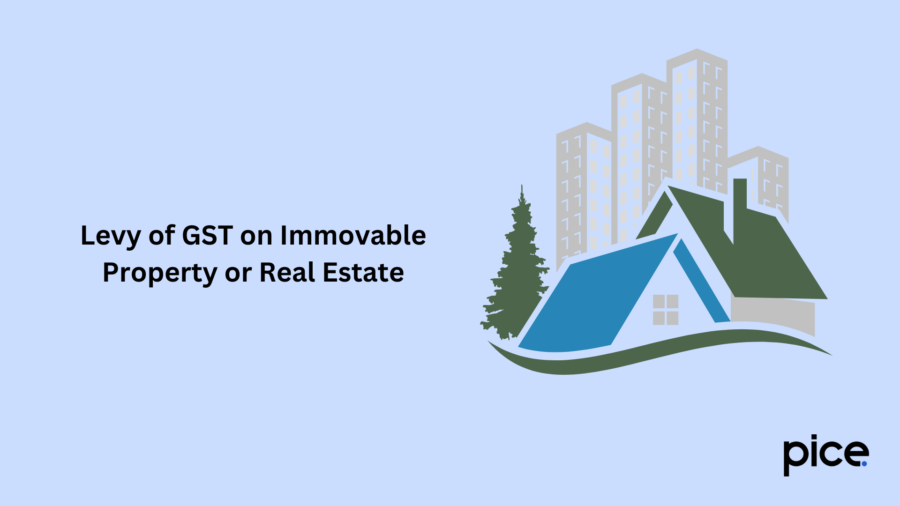
The idea that real estate or immovable properties do not attract GST is not true. However, when you scrutinise Schedule III in Section 7(2)(a) of CGST, 2017, you can learn that the sale of a building or land has been marked as GST-exempt.
As per Section 7, the supply scope for immovable properties proves to be broad enough to comprise other related businesses like construction services, renting businesses and more. The only provision left out of the GST scope is the sale of land or buildings.
Consequently, many services associated with immovable property are subject to GST levies. These are particularly covered under Para 2 of Schedule II. You can have a glimpse of those offerings here:
- Any deed of lease, tenancy or relevant licence to occupy land
- Any lease or legal document signifying that a building has been partly rented out. This rule applies to industrial, commercial properties as well as residential properties and has been highlighted under para 5 of Schedule II
- Renting of immovable property
- A competent authority constructing a building, complex or civil structure that is intended for sale to buyers. The GST rules for this have been mentioned within S. 7 (1A) of the CGST Act, 2017.
Note: While considering the applicability of tax rates for GST on immovable property, the location of the property is identified as the place of supply.
Types of Services Related to Immovable Property Exigible Under GST
The following types of services associated with immovable properties are subject to GST charges:
- Renting of a Property and Any Lease, Tenancy, Easement or Licence
Based on Section 7(1) of the GST law, supplies within the real estate sector comprise all types of supplies, including rental contracts that benefit the furtherance of business. Besides this, as you refer to Para 5 of Schedule II under the CGST Act, you will see that renting out any property draws GST. However, the rate is not fixed and can vary depending on time-to-time updates from the GST Council. At present, tenants need to pay 18% GST on rental properties.
Conversely, settlements that are meant for residential properties do not fall under the GST realm. Nonetheless, residential properties subleased for business purposes, such as a hotel, cannot register itself as a 'residential dwelling.'
In fact, hotel leases are treated according to Para 2 of Schedule II of the GST law. On a positive note, the law continues to offer some relaxations in cases specific to landlords whose businesses did not earn more than ₹20 lakh during the previous financial year.
Therefore, as you can see, the service of leasing out immovable property is a major contributor to the real estate economy. For this reason, the government does not exempt it from taxation.
Additionally, other forms of lease agreements, like a rent contract in which partial payment has been received or those with a one-time premium, fall under Para 2 of Schedule II. Licenses of immovable properties are also counted as taxable supplies.
Eventually, the GST Council levied tax rates on subtenancy too, which is included in Para 2 of Schedule II. Some of the valid supplies under this segment include license to occupy land, lease, tenancy, and easement.
Finally, the eligible entities charge GST on the leviable tenancy premium, commonly known as the Pagadi system. According to this method, the tenant obtains tenancy rights for a property after paying Pagadi or a tenancy premium.
2. Construction Services in Different Real Estate Projects
Residential properties or flat systems are typically the most prevalent form of housing in urban settings. These buildings are constructed by professional builders, and individual flats are sold out to buyers. To bring in more transparency and reduce the tax burden for both builders and developers, the GST was brought into this segment.
Based on Para 5 of Schedule II, GST will be levied on flat constructions that are intended for sale to a retail buyer. However, for this rule not to apply, the flat in question must have a completion certificate or occupancy certificate, especially if it was previously occupied. So, you may conclude that only unfinished or under-construction properties attract GST, and ready-to-move-in flats are not subject to GST.
As a buyer, you will incur GST on immovable property only if you are availing of the construction service from the builder. Otherwise, you will not be liable to pay GST.
From 1st April 2019, the promoters started charging revised GST rates on construction services involving residential properties or complexes. For this, two separate tax rates are set for two different property categories:
- The effective GST percentage on building affordable housing solutions is 1% when the developer does not claim an input tax credit (ITC). Similarly, the GST rate is 5% without ITC for luxurious properties or non-affordable homes.
- The new provisions have also offered the option to settle GST according to the old rates (8% and 12%). Those opting for this solution can avail ITC upon selling their services and may also extend the benefits to the buyer.
Note that all projects initiated on or after 1st April, 2024 are required to mandatorily follow GST payment norms according to the new GST rates.
What is Working Contracts?

A works contract is explained under Schedule II of CGST. While going through Section 2(119), you see working contracts as composite supplies. They simply club two or additional services/goods that can be naturally bundled.
Wherever transfer of property as 'goods' is involved, contracts for any construction, fabrication, repair, installation, erection, etc., are termed as work contracts. Especially, these represent a supply of services linked to an immovable or movable property.
Nevertheless, under the GST law, work contracts are only considered for immovable property or real estate. After a work is executed, that specific supply is regarded as part of the immovable property.
Note: Transmission towers are a form of immovable property from the beginning as stated in GST law.
Transfer of Development Rights
The Land Acquisition Scheme had been originally introduced so that a State Government could compensate the concerned landowner for using their plot/land for constructing any public place. Such initiatives cover the widening of roads, building a public garden or offering civic amenities.
In order to avoid complications in these instances, the Development Right Certificate (DRC) was introduced under the GST realm.
The DRC enables a landowner to offer their real estate to any developer or builder or any other person in exchange for some agreement. They may be directly involved and sign a Joint Development Agreement.
The DRC is an official document that legally authorises landlords to retain additional built-up areas as compensation for granting exclusive rights to government-undertaken areas. These Development Rights are referred to as Transfer of Development Rights (TDR) by real estate developers.
What Is the Immovable Property?
The term immovable property covers a wide range of elements. These specifically refer to land, establishments attached to the earth or any such benefits from land. Under the GST regime, it has a wide scope primarily arising out of land.
For developers, one such perk consistently arising out is TDR. As per the verdict passed by the Bombay High Court, TDR is held as a form of immovable property. However, for clarity, certain arguments from the AAAR Vilas Gandhi were referred to, which led to the emergence of another complex question.
What Is Land?
According to clause 3(p) pertaining to the Right to Fair Compensation and Transparency in Land Acquisition, Rehabilitation and Resettlement, 2013 and Section 2(16) of Maharashtra Land Revenue Code, 1966, the definition of land signifies any particular gains that arise out of the land. The elements that are grounded to the earth fall under this definition.
Taxability of Sale of Land Under Pre-GST Laws
When GST did not exist, the sale of goods was subject to Value Added Tax (VAT). In this regard, goods represented all types of moveable property. Therefore, the land did not attract any VAT as it is categorised under immovable goods. Nonetheless, stamp duties persisted on the sale of lands.
Implications of GST on Immovable Property and Exemptions
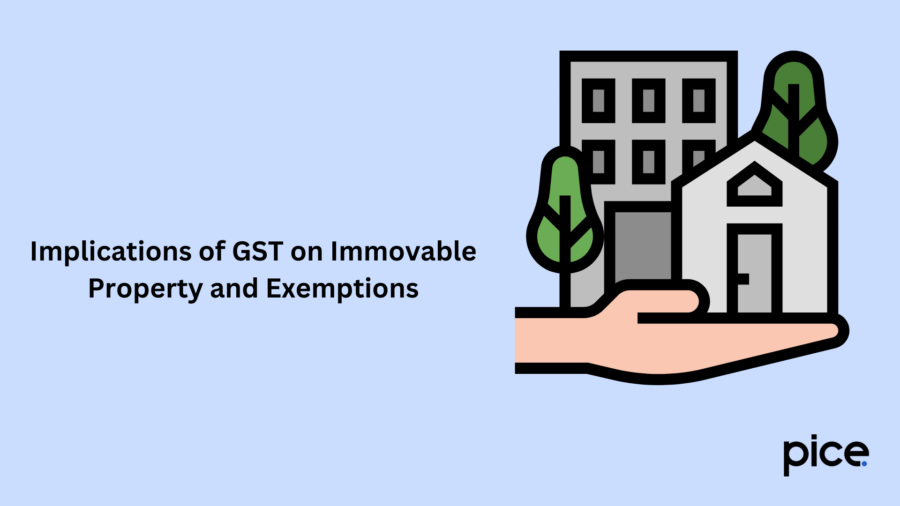
According to Schedule III of the CGST Law, a sale of land is neither tagged as a supply of goods nor delivery of services. Rather, lands are immovable properties on which the developers need to pay stamp duty. Therefore, GST is not applicable to transactions involving land.
The Gujarat Authority For Advance Ruling (AAR) has, however, opposed in a verdict that GST is not valid on selling land only when the event involves the switching of land ownership. Contrarily, if such transactions include services such as water line installation, electricity line installation, land levelling, and more, which are often part of plotted developments, then GST must be imposed on these transactions.
It is a valid argument as services related to plotted developments are meant to be listed under the Schedule II Para 5 Clause (b) definition of the CGST Act.
As you can see, when GST applicability is concerned, the specific nature of the transaction is truly important. When a land seller imposes an amount that covers charges for common facilities, it will include services that fall under the purview of GST.
Value, Time and Place of Supply of Land According to GST Provisions
According to the GST law, a supply’s value is the final price that a seller charges from their buyers. A land is identified to be an immovable property. Hence, no GST is imposed on selling land.
However, if a composite supply, such as in plotted developments, where land is supplied along with other offerings, is under question, the buyer will be subject to GST.
Under the GST Act, a service’s time of supply will be:
- Date of invoice issuance or the date on which payment is received, whichever comes earlier
- Date on which the services were delivered, if no invoice is generated within the predetermined time frame as per Section 31(2). The payment receipt date can also be considered if that comes earlier.
- The date the recipient records the received services in their accounting records. This rule is followed when the regulations listed under clause (a) or clause (b) emerge as void.
Generally, under the purview of GST, the place of supply is considered to be the location of the recipient named on the final invoice. However, if any service is associated with immovable properties, the GST Council considers the property's address as the place of supply.
Input Tax Credit Rules for Supply of Immovable Property
Section 17(5) of the CGST Act does not enable builders to claim ITC on services or goods bought by them for use in business.
The plot owner or a professional third-party builder can be entrusted with the construction.
If a third party constructs the property, ITC will not be valid for works contract solutions wherever an immovable property is involved. However, this rule is exempt from building any machinery or plant.
Only a person in the same business can file a valid ITC claim for future benefits on the supply of works contract services. Thus, until the degree of capitalization is established, the GST Council does not authorise ITC claims for immovable property construction. Sellers can opt for ITC only if their business is of a revenue nature.
On the other hand, if a taxable person continues with the construction by themselves and the resources procured are used for the furtherance of business then ITC is not provided for inward supplies.
GST Provisions on Sale of Developed Plots or Land
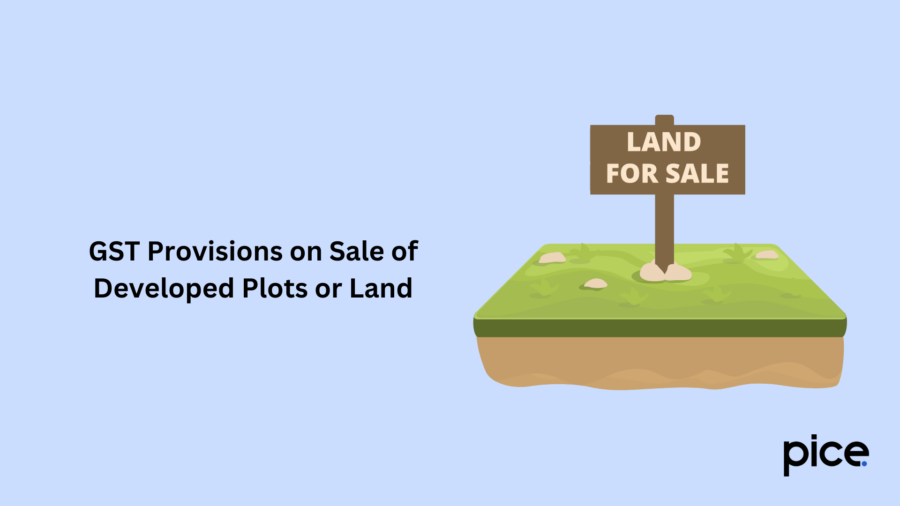
Schedule III of the CGST law clearly states that selling land will not incur GST charges if that particular transaction is aimed to shift the ownership of land. In these cases, the nature of transactions determines the applicability of GST on immovable property or land.
In events when the seller of the land offers day-to-day facilities like drainage line, electricity line, land levelling, water line, etc., then those services are regarded as a valid 'supply' under the GST Act. Hence, to speak conclusively, the substance of the agreement signed between all the involved parties is vital.
When a seller imposes the final price depending on the super built-up zone and not the actual dimensions of the plot, then it is likely that the buyer is paying for land along with basic amenities, such as water lines, drainage and adjoining road. These transactions cannot be classified under the sale of land and are instead highlighted as a sale of a developed plot.
According to Schedule II, clause 5(b) of the CGST Act, building complex constructions or constructing any civil structure which will be sold later is liable to incur GST.
GST Implications on Renting and Leasing of Land
As per the GST regulations, a supply covers all kinds of transactions of services and goods or in some cases, both. In the real estate sector, it covers the sale, transfer, lease rent, barter and even disposal of immovable property made by an authorised owner for the furtherance of business.
So, it is clarified that both leasing and renting of immovable property are held as valid supplies under the GST Act and thus they attract tax.
Based on Para 2 of Schedule II of the CGST Act, any tenancy, lease or licence to use land will be considered as a supply of service.
In this context, you must be aware of two different types of lease agreements:
Long-term Lease of Land
Based on a decision made at the Bombay High Court, a flat 18% GST is applicable on a one-time premium paid towards a long-term lease of land. The tenure in this case can range from 30 years or more.
Short-term Lease of Land
These contracts also attract a GST rate of 18%.
Nevertheless, the following types of lease agreements are devoid of any GST charges:
- The upfront amount has been furnished for a long-term lease of commercial plots or lands for infrastructural development overseen by the Central or State Government. Also, for financial activities in land transactions conducted by entities holding 20% or more ownership of government bodies, lease agreements are GST-exempt.
- Renting or leasing of vacant land having/ not having structures that are incidental to its use
- Renting/ leasing of agro machinery
So, farmers cannot charge GST for leasing our vacant land or agricultural plots. However, commercial plot leasing attracts GST.
Conclusion
When understanding the applicability of GST on immovable property, you must understand the whole context of a land sale. As in most cases, a composite supply is involved. Thus, thorough analysis comes into play to determine the taxability. It is advisable to approach GST experts in case you face doubts regarding GST implications and require advisory services on a specific transaction.
💡If you want to streamline your payment and make GST payments, consider using the PICE App. Explore the PICE App today and take your business to new heights.
 By
By 






